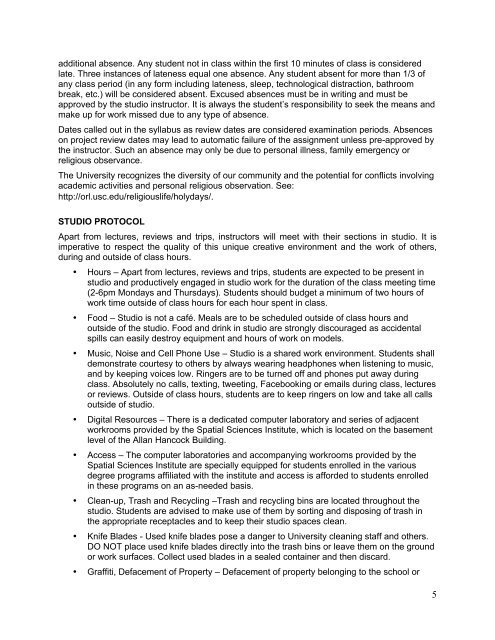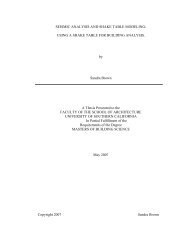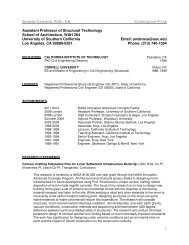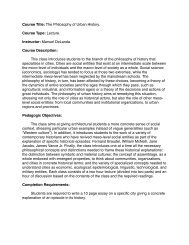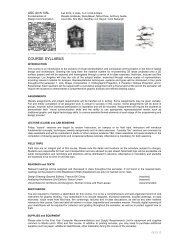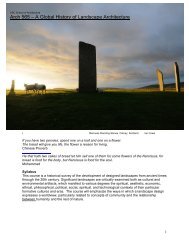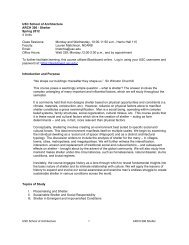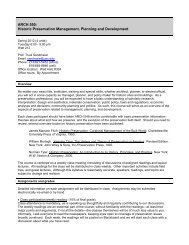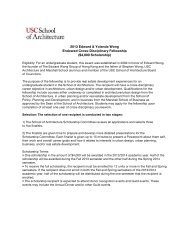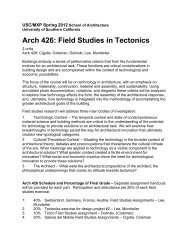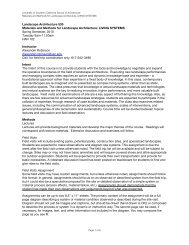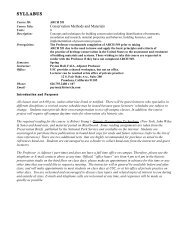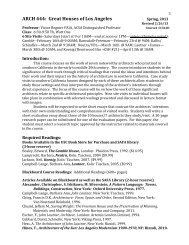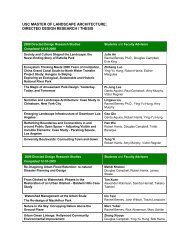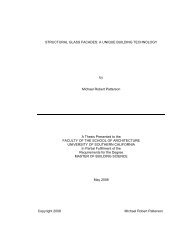ARCH 303-Sample Syllabus - USC School of Architecture
ARCH 303-Sample Syllabus - USC School of Architecture
ARCH 303-Sample Syllabus - USC School of Architecture
Create successful ePaper yourself
Turn your PDF publications into a flip-book with our unique Google optimized e-Paper software.
additional absence. Any student not in class within the first 10 minutes <strong>of</strong> class is considered<br />
late. Three instances <strong>of</strong> lateness equal one absence. Any student absent for more than 1/3 <strong>of</strong><br />
any class period (in any form including lateness, sleep, technological distraction, bathroom<br />
break, etc.) will be considered absent. Excused absences must be in writing and must be<br />
approved by the studio instructor. It is always the student’s responsibility to seek the means and<br />
make up for work missed due to any type <strong>of</strong> absence.<br />
Dates called out in the syllabus as review dates are considered examination periods. Absences<br />
on project review dates may lead to automatic failure <strong>of</strong> the assignment unless pre-approved by<br />
the instructor. Such an absence may only be due to personal illness, family emergency or<br />
religious observance.<br />
The University recognizes the diversity <strong>of</strong> our community and the potential for conflicts involving<br />
academic activities and personal religious observation. See:<br />
http://orl.usc.edu/religiouslife/holydays/.<br />
STUDIO PROTOCOL<br />
Apart from lectures, reviews and trips, instructors will meet with their sections in studio. It is<br />
imperative to respect the quality <strong>of</strong> this unique creative environment and the work <strong>of</strong> others,<br />
during and outside <strong>of</strong> class hours.<br />
• Hours – Apart from lectures, reviews and trips, students are expected to be present in<br />
studio and productively engaged in studio work for the duration <strong>of</strong> the class meeting time<br />
(2-6pm Mondays and Thursdays). Students should budget a minimum <strong>of</strong> two hours <strong>of</strong><br />
work time outside <strong>of</strong> class hours for each hour spent in class.<br />
• Food – Studio is not a café. Meals are to be scheduled outside <strong>of</strong> class hours and<br />
outside <strong>of</strong> the studio. Food and drink in studio are strongly discouraged as accidental<br />
spills can easily destroy equipment and hours <strong>of</strong> work on models.<br />
• Music, Noise and Cell Phone Use – Studio is a shared work environment. Students shall<br />
demonstrate courtesy to others by always wearing headphones when listening to music,<br />
and by keeping voices low. Ringers are to be turned <strong>of</strong>f and phones put away during<br />
class. Absolutely no calls, texting, tweeting, Facebooking or emails during class, lectures<br />
or reviews. Outside <strong>of</strong> class hours, students are to keep ringers on low and take all calls<br />
outside <strong>of</strong> studio.<br />
• Digital Resources – There is a dedicated computer laboratory and series <strong>of</strong> adjacent<br />
workrooms provided by the Spatial Sciences Institute, which is located on the basement<br />
level <strong>of</strong> the Allan Hancock Building.<br />
• Access – The computer laboratories and accompanying workrooms provided by the<br />
Spatial Sciences Institute are specially equipped for students enrolled in the various<br />
degree programs affiliated with the institute and access is afforded to students enrolled<br />
in these programs on an as-needed basis.<br />
• Clean-up, Trash and Recycling –Trash and recycling bins are located throughout the<br />
studio. Students are advised to make use <strong>of</strong> them by sorting and disposing <strong>of</strong> trash in<br />
the appropriate receptacles and to keep their studio spaces clean.<br />
• Knife Blades - Used knife blades pose a danger to University cleaning staff and others.<br />
DO NOT place used knife blades directly into the trash bins or leave them on the ground<br />
or work surfaces. Collect used blades in a sealed container and then discard.<br />
• Graffiti, Defacement <strong>of</strong> Property – Defacement <strong>of</strong> property belonging to the school or<br />
5


